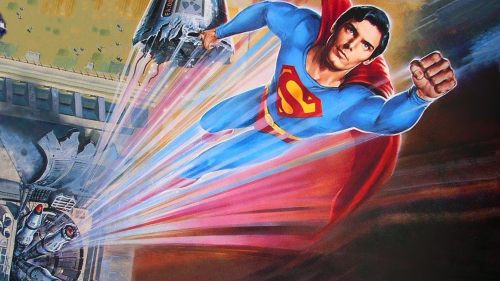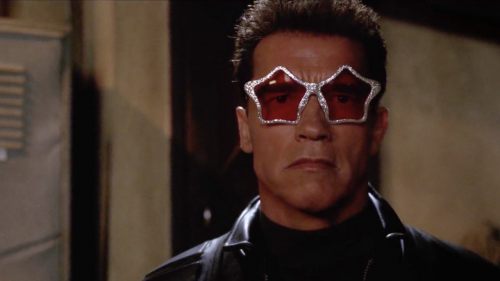Say Something Nice: TERMINATOR GENISYS
Terminator Genisys is a crummy movie. The fifth feature in the science fiction series inspired by a nightmare James Cameron couldn’t forget, Genisys was meant to resurrect Terminator and launch it into today’s world of vast, multimedia franchises. Three years later, it’s been discarded in favor of an upcoming picture with similar aims. Given the circumstances of its making (per star Emilia Clarke, “No one had a good time” during Genisys' filming) and the truly sour final product, that’s an understandable decision.
Genisys’ special effects are over-used and cheap-looking – a far cry from the carefully employed FX work in Terminator and Judgment Day, which has aged gracefully. Its story is filled with interesting ideas that could make for a very neat Terminator tale – a benevolent Terminator raises a human all the way to adulthood, a time traveler finds the past he expected to arrive in scrambled, and overarching series villain Skynet is actively parented by one of the Terminators in its service. Without fail, all of these ideas are skimmed over or reduced to vague hints for the never-to-be-made sequel.
The script itself is a smorgasbord of poor writing. Its exposition could only be more blatant if the characters read from the script onscreen. Its key relationships – between Sarah Connor and Pops, the Terminator who raised her, and between Connor and Kyle Reese, mistake mawkishness for genuine emotion. Their incessant sappiness extends all the way to Genisys’ final battle, where Reese and Connor come to the aid of Pops in his battle against Evil Terminator John Connor. Instead of a moment in the spirit of Connor rallying the wounded Reese with battle orders in the first Terminator or the maimed T-800 pulling himself through factory gears to save the Connors in Judgment Day it plays like an invocation of the almighty power of friendship, as though Genisys was a rote, hacky action cartoon written by someone who holds kids in contempt.
And the miscasting. All praises and glory to BMD’s patron saint Jai Courtney, but his take on Kyle Reese is a flat cup of SURGE to Michael Biehn’s fresh-brewed root beer. Given his strong turn as Werner Herzog’s sadistic chief enforcer in Jack Reacher, Courtney could have worked as an angry, bitter Reese. Instead, the trauma, desperation and surprising tenderness of Biehn’s Reese are sanded away in favor of vague heroism and yelling. Emilia Clarke gets even less to work with as Genisys’ disastrous interpretation of Sarah Connor. She’s less a character than a plot object. The fear and resourcefulness of the first Terminator’s Sarah is nowhere to be found, nor is the rage and redemption of Judgment Day’s. In Genisys, Sarah’s most human moment comes during a montage where she has a brief chance to enjoy music she loves while preparing for battle. Otherwise, Clarke is stuck waffling between being a vague badass and constantly bemoaning her apparent destiny while the movie happens around her.
Arnold Schwarzenegger is a treat as any Terminator, but Pops’ charm comes entirely from him, rather than the writing. His big, emotional moment – asking Reese to take care of “his Sarah” before sacrificing himself - is irritating. Despite Arnold’s efforts to give it feeling, it just hammers home Genisys’ shabby reduction of Terminator’s heroine to a sexy lamp.
Terminator Genisys is atrocious. But there is one thing in it that is truly worthy of laurels – Jason Clarke’s turn as John Connor. Now, most of Clarke’s performance isn’t strictly speaking “John Connor.” Outside of the prologue and one brief scene later on, Clarke mostly plays “the T-3000, John Connor brainwashed and turned into a Terminator.” The 3000 isn’t without his charms – the scenes where he marvels at his transformation and privately comforts a young Skynet are striking. But by and large he’s a CGI villain who simply can’t match the terrifying power of Arnold’s first Terminator or Robert Patrick’s T-1000. As the real John Connor though? Clarke is fantastic.
Clarke makes this John feel like a man who grew up under the parenting and tutelage of Linda Hamilton’s Sarah. In battle, he fights with swift purpose. When laying out a plan, he’s determined and makes a point of speaking plainly and calmly. And in a private moment with Kyle Reese, one of the few people who actually knows John as a person rather than the savior of the human race, Clarke brings out a surprising sweetness.
That conversation, devoid of the half-baked ideas and irritating would-be-franchise-building that pervades so much of Genisys, is Clarke’s best piece of acting as John and maybe the best moment in the film. In order to ensure his existence, John must doom his father to a violent death and his mother to years of grief and trauma. Furthermore, he has to lay the seeds for Kyle to fall for Sarah for years before they’ll meet. He’s happy to tell the good-hearted man who will become his dad about the incredible woman who raised him, but it’s still uncomfortably manipulative. John Connor carries a lot of guilt, and Clarke hints at that in the uneasy smile he gives Kyle when the younger man asks what he’ll do when Skynet has fallen. There’s uncertainty too, in the brief pause John gives before realizing that the only answer he can think of is a cold beer. He and Kyle share a laugh at his ambition, but as the conversation winds down and John heads for his war room, Clarke brings the sadness and melancholy that he and his mother have both carried to the front. He apologizes to Kyle as best he can without revealing his fate, a gesture of and bitter pragmatism. Thanks to Clarke’s performance, it’s a strikingly human moment in an otherwise vexingly soulless picture.



